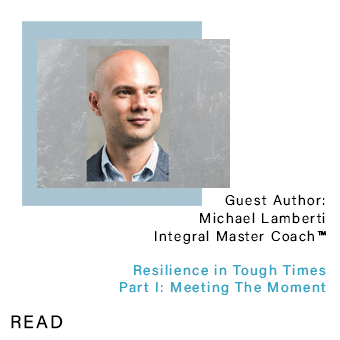Blog

“I've rarely experienced a 'training' program that so effectively combines rigorous methodology with generous heart. I now have a living compendium of precise, relevant practices.”
“Working with Joanne and Laura has been transformational at many levels of my life. Through their Integral Coaching® training, I have come to understand what “being human” means.”
“Integral Coaching Canada provides what we believe is the most complete and comprehensive coaching program available. ”

Resilience in Tough Times Part I: Meeting the Moment
Michael Lamberti is an Integral Master Coach™ in private practice in Toronto. He also serves as a content producer and social media strategist for Integral Coaching Canada, as well as a member of the ICC Observer Faculty Team. When not coaching, Michael practices Zen meditation and Chen-Style Practical Method Taijiquan. His website is: www.mlcoaching.ca
I’ve had a rapid journey with Integral Coaching Canada. Within the span of three years, I went from a slightly skeptical client of an Integral Master Coach™, to a fully certified Integral Master Coach™, to a new member of the Integral Coaching Canada (ICC) faculty team. Looking back, I can unreservedly say that I got what I wanted and expected out of the Integral Coaching® Certification Program (ICCP). In addition to attaining an embodied level of the ICC coaching method and coaching capabilities, I understand myself better and have put that understanding to good use. The depth of my training as a coach is evident in my work, and I feel part of a vibrant community. What I did not expect, and have had to contend with, is how interlaced my ICC journey has been with significant pain and deep loss in my life. I lost my grandfather in March 2016, right in the middle of my training in the first module of ICCP, the Associate Certification Module. Just two years later, my father died in May 2018, on a day that I was serving as a class assistant for the Master Certification Module, which had just begun in Ottawa.
I bring this up because one of the most consistently reported results from clients who complete an Integral Coaching® program is that they feel more resilient, more able to endure and bounce back. It’s a facet and result of the ICC Method that I’ve had a profound lived experience of, and this feels like the right time to explore it, celebrate it, and share it in a brief blog series on what I’ve learned about resilience through my ICC experience.
So what is resilience? In an interview filmed for ICC’s Resilience + Reach Online Global Summit, Co-Founder Joanne Hunt gives two definitions. The first, a more traditional dictionary definition, that she offers is, “The ability to bounce back. Or, the ability to recover quickly from something that’s happened.” It’s a straightforward definition, and Joanne wonders about its continued relevance today, given that people no longer have the same long cycles of time to recover and bounce back. She suggests that a second, emerging definition of resilience that acknowledges the increasing speed of our world could be, “Developing the ability to meet each moment as it arises. To meet it with our ongoing wellness, our ongoing spaciousness, our ongoing awakeness to what’s arising right now.” Want to learn more about meeting the moment? Read Joanne’s Meeting the Moment blog.
Personally, I connect with both definitions. At first glance, I think resilience can often look like a straightforward capacity to bounce back and recover quickly. It’s when we zoom in to what is going on in ourselves or someone else in the process of bouncing back and recovering, that we can start to see the deeper process of meeting and allowing for the reality and quality of each moment. I didn’t have a goal or objective when mourning or grieving the men in my family with whom I was closest. As I mourned, it was occasionally in the back of my mind how complicated and inconvenient it might be to have to withdraw from the commitments I had made in my ICC training modules. However, the capacity I developed as a client, and then as a student, to meet each moment as it arose seemed to help me process my losses in such a way that it felt okay and interesting to get back to work in a relatively short amount of time, with greater resilience.
I’m not saying that the goal and measure of success of resilience is to get “back to normal” and productivity as quickly as possible after something painful happens. Not at all. This is not the kind of resilience that I am talking about. This is where Joanne’s second definition is helpful. Sometimes being awake to what’s arising moment by moment means accepting the need to not be okay in a given moment and interrupting the flow of “normal” life—where you can—in order to honour and attend to that. Yet, paradoxically, this capacity to attend and accept moments as they come, even the not okay ones, can have a profoundly stabilizing quality.
What I also came to deeply understand through the ICC coach training is that capacities, such as the capacity to attend to and accept moments as they arise, can be developed and embodied through active engagement practices. Therefore, with ICC’s focus on development and embodiment as a key driver of change and human development, engaging in regular practices is part of the change process. This holds true for both the clients of Integral Coaches™ as well as students going through ICC’s Integral Coaching® training.
Practices in an Integral Coaching® program are “new doings” designed to be a little bit outside of one’s comfort zone in order to develop targeted capacities. Examples of the targeted capabilities that can be developed through engaging in practices as part of a coaching program can include: being more able to notice emotions in the body, or being more able to skilfully speak up on behalf of your point of view. No matter what the capacity is or the practice that is designed to develop it, it’s going to be a little bit of a stretch, and a little bit uncomfortable. Of course it would be! It is expanding and going beyond your current levels of capability and embodiment.
What I directly experienced in my journey of development and embodiment is that through doing enough practices, enough times, the feeling of being uncomfortable itself starts to become more comfortable. First, a cognitive understanding starts to develop that I am changing and developing through these practices (“Engaging with this practice my coach designed to be just the right amount of uncomfortable is paying off. I should stick with it!”). This cognitive understanding, when reinforced through different practices over the course of a full coaching program, became an embodied understanding. I came to know it in the marrow of my bones; it can become a habit to not tune out from uncomfortable moments. Applied broadly and frequently enough across a life, the results of this habit are transformative – for me, and for you. As the poet, healer, and teacher Kim Rosen once said, “When you welcome what you've been running from, your life is no longer shaped by trying to avoid it.”

Photo credit: Western Arctic National Parklands
Are you interested in developing a taste of this resilience for yourself? Here is a practice that you are welcome to try. It is similar to one I would design for my clients who are focusing on advancing their capacities to attend to and accept each moment as it arises. Remember, the idea is to have it be just outside of your comfort zone enough that it’s a stretch for you, but not daunting or destabilizing. Feel free to experiment with frequency and duration as you try to find that sweet spot.
- Find a quiet place where you can sit alone with no distractions. You can either sit in a chair or your usual meditation posture if you already have a practice. For 5 minutes, just sit, doing your best to pay attention to each moment. You don’t have to try to think or feel anything in particular. Just give yourself that time to think what you happen to be thinking and feel what you happen to be feeling. Notice and accept whatever comes up.
- As you do this, see if you can name what you’re feeling as it arises. Maybe you’re angry for the first few minutes; highly anxious about what will happen for the next few minutes; and then, for the last minute of practice, you start to feel amusement in response to your rapid changes in mood.
- When you notice that your attention has drifted from noticing, accepting, and naming the present moment, it’s no problem. Simply notice and accept that the drift has occurred before bringing your attention back to each moment.
- Once this practice feels more natural after a period of consistent daily engagement (perhaps two weeks or so) see if you can also identify and name where in your body you feel what you’re feeling as you name it. Is that anger felt in a tightening of your jaw? The anxiety as a sinking in your belly? The amusement as a lightness around your eyes?
With each moment spent in practice, you build your capacity to see that moment clearly and accept it for what it is. Through the joyous moments and the uncomfortable ones, you have started building resilience – the ability to be present in each moment as it arises with wellness, spaciousness, and awakeness.










